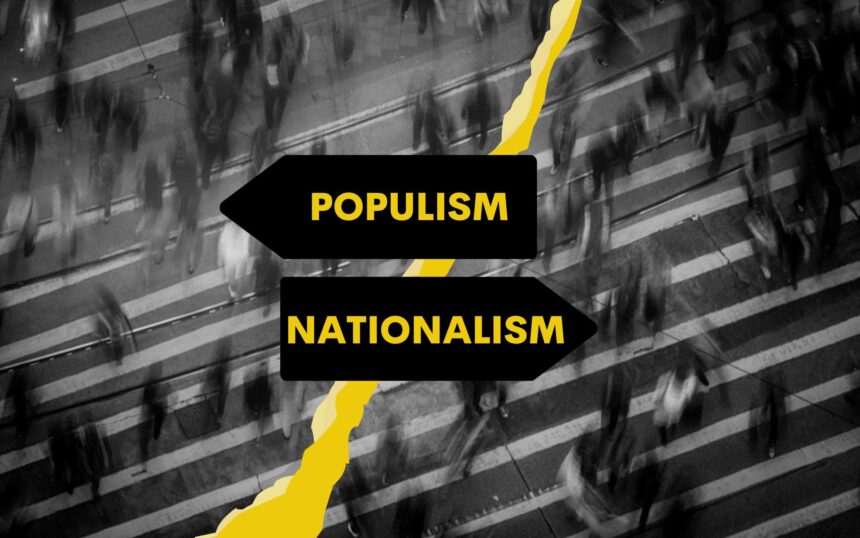The Rise of Populism and Nationalism in 2025: Global Trends and Implications
In 2025, the world is witnessing a continued rise of populism and nationalism, reshaping the political landscape across multiple regions. These ideologies have gained significant traction in response to various global challenges, including economic inequality, immigration, cultural shifts, and dissatisfaction with traditional political elites. Populism and nationalism have been prominent forces in recent years, and their influence is expected to grow, with wide-ranging implications for global stability, democracy, and international relations.
While populism and nationalism may take different forms in various countries, both movements typically revolve around the idea of reclaiming national sovereignty, protecting cultural identity, and challenging perceived political, economic, and social elites. These ideologies have both supporters and detractors, and their rise continues to spark debates about the future direction of countries and the international order.
1. Understanding Populism and Nationalism: Rise of Populism and Nationalism
Populism; Rise of Populism and Nationalism
Populism is a political approach that seeks to represent the interests of ordinary people against the perceived corruption or elitism of the establishment. Populist leaders often frame their campaigns around the idea that the “common people” are being oppressed or ignored by the elites and institutions in power. Populist movements can be both left-wing or right-wing, but they share a common theme of rejecting traditional political structures and advocating for a more direct connection between leaders and the people.
Populist rhetoric often includes anti-establishment sentiment, distrust of mainstream media, calls for national sovereignty, and promises of policy reforms aimed at addressing the needs of the working class. Populist leaders tend to present themselves as outsiders or champions of the people, who will break from established political norms to create a more inclusive or nationally focused system.
Nationalism; Rise of Populism and Nationalism
Nationalism is an ideology centered around the promotion of a nation-state and the interests of a particular national group, often emphasizing pride in national identity, culture, and heritage. Nationalists typically advocate for policies that prioritize the interests of their nation over international cooperation or the influence of foreign powers.
In recent years, nationalism has been fueled by concerns over globalization, immigration, and cultural changes. Nationalist movements often promote strict immigration policies, protectionist trade measures, and policies that emphasize the preservation of national culture and values. Nationalism can manifest in a variety of ways, from moderate cultural pride to more extreme forms that involve exclusionary policies or even xenophobia.
2. Key Factors Driving the Rise of Populism and Nationalism; Rise of Populism and Nationalism
Economic Discontent and Inequality: Rise of Populism and Nationalism
Immigration has been a central issue driving the rise of nationalism, particularly in Europe and North America. Many nationalist movements focus on restricting immigration, arguing that large influxes of migrants pose a threat to national identity, security, and cultural values. The debate over immigration is deeply tied to broader cultural anxieties, as some segments of the population fear that their country’s traditional way of life is being undermined by the arrival of foreign cultures.
Populist and nationalist leaders often frame immigration as an existential threat, using rhetoric that links immigration with rising crime, economic strain, and the erosion of national culture. These sentiments have led to the enactment of stricter immigration laws, border controls, and anti-immigration campaigns in many countries, such as the U.S., Hungary, Poland, and Italy.
Distrust of Political Elites: Rise of Populism and Nationalism
There is a growing distrust of political elites, established political parties, and international institutions. In 2025, people in many countries feel that political elites are disconnected from the needs and concerns of the general population. This sense of disconnect has fueled populist movements that seek to challenge the status quo and shift power away from traditional political structures.
Populist leaders often position themselves as anti-establishment figures who will dismantle the entrenched political order and bring about reforms that benefit the average person. They claim that the elites—whether they are politicians, corporate leaders, or technocrats—are out of touch with the reality of ordinary citizens and are more focused on their own interests than the well-being of the people.
Globalization and National Sovereignty: Rise of Populism and Nationalism
Globalization has been a key driver of populist and nationalist sentiments. While globalization has led to economic growth and technological advancement, it has also created significant challenges for many countries, including the outsourcing of jobs, the decline of traditional industries, and the erosion of national sovereignty. Many populist and nationalist movements argue that globalization has disproportionately benefited multinational corporations, while leaving ordinary citizens and national economies vulnerable.
Nationalists advocate for policies that prioritize national interests over international cooperation, and they often criticize global organizations such as the United Nations (UN), the European Union (EU), and the World Trade Organization (WTO). Nationalist leaders argue that countries should regain control over their borders, economies, and policies, free from the influence of international institutions or foreign powers.
3. Regional Variations of Populism and Nationalism; Rise of Populism and Nationalism
Europe: The Rise of Right-Wing Nationalism: Rise of Populism and Nationalism
In Europe, nationalism has been particularly prominent in the wake of the refugee crisis, the economic fallout from the COVID-19 pandemic, and growing concerns over the European Union’s role in national politics. Right-wing nationalist parties have gained significant support in countries like Hungary, Poland, France, and Italy. These parties often advocate for strict immigration controls, protectionist economic policies, and a return to traditional national values.
In the UK, Brexit remains a major example of nationalism, with the decision to leave the EU driven by a desire for greater national sovereignty and control over immigration. Other European nations have seen the rise of populist leaders who frame themselves as defenders of national identity against the forces of globalization and multiculturalism.
The United States: Populism and Nationalism Under Trumpism: Rise of Populism and Nationalism
In the United States, populism has been particularly associated with Donald Trump and his political movement. Trump’s brand of populism centers around anti-establishment rhetoric, nationalist policies, and an “America First” approach to foreign and domestic policy. In 2025, Trump’s influence continues to shape the U.S. political landscape, with his supporters advocating for nationalism, immigration restrictions, and a retreat from international agreements.
Populist rhetoric in the U.S. often targets both domestic issues, such as economic inequality and immigration, and international issues, such as trade deals and foreign alliances. The rise of Trumpism has sparked debates over the future of American democracy, with critics warning that his nationalist agenda threatens democratic norms and global stability.
Latin America: Populist Leaders and Political Instability: Rise of Populism and Nationalism
In Latin America, populism has historically been a dominant force in politics, with leaders like Hugo Chávez in Venezuela and Eva Morales in Bolivia championing populist agendas. In 2025, populism remains a significant force in countries such as Mexico, Brazil, and Argentina, where leaders promise to fight inequality, challenge elites, and protect national sovereignty.
Populist leaders in Latin America often draw support from the working class and indigenous communities, promising to redistribute wealth and challenge foreign influence. However, populist policies in the region have also been criticized for exacerbating political instability, economic crises, and authoritarianism.
4. The Implications of Populism and Nationalism in 2025; Rise of Populism and Nationalism
Impact on Democracy: Rise of Populism and Nationalism
The rise of populism and nationalism has profound implications for democracy. While populist movements often claim to represent the will of the people, they can also undermine democratic institutions by concentrating power in the hands of charismatic leaders and curbing the influence of opposition parties and civil society. In some cases, populist leaders have eroded checks and balances, stifled dissent, and undermined the rule of law.
Nationalism, when taken to extremes, can lead to exclusionary policies, intolerance, and even conflict. Nationalist movements that prioritize national identity over inclusivity can alienate minorities and stoke social divisions.
Global Tensions: Rise of Populism and Nationalism
Nationalism and populism have also contributed to rising tensions between countries. Populist leaders often criticize international agreements and organizations, viewing them as threats to national sovereignty. This has led to the breakdown of alliances, such as in the case of Brexit, and strained relations between countries that prioritize national interests over global cooperation.
Future Outlook: Rise of Populism and Nationalism
The rise of populism and nationalism in 2025 is a complex and multifaceted phenomenon, with both positive and negative consequences. On the one hand, populism can empower marginalized groups and challenge entrenched political systems, while nationalism can foster a sense of national pride and unity. On the other hand, these ideologies can also lead to political instability, social division, and a decline in international cooperation.
As countries continue to grapple with these forces, the challenge will be to find a balance between national sovereignty and global cooperation, while ensuring that the rights and voices of all citizens are respected. The future of populism and nationalism will depend on the ability of political leaders to address the underlying grievances that fuel these movements, while upholding the principles of democracy, human rights, and social justice.










